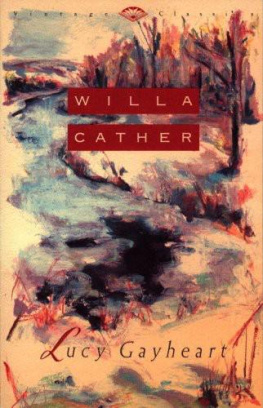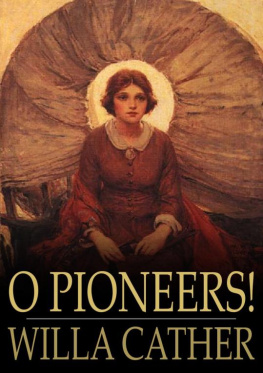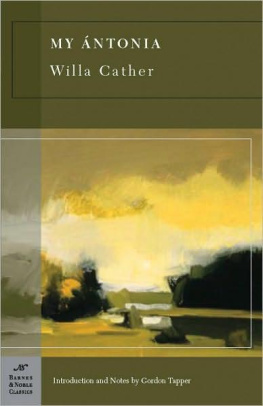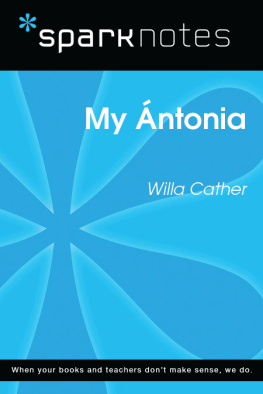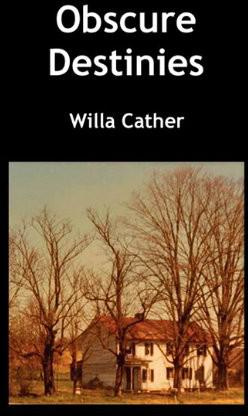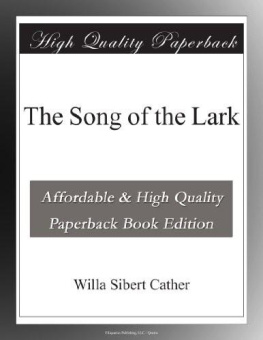Willa Cather - My Antonia (Modern Library)
Here you can read online Willa Cather - My Antonia (Modern Library) full text of the book (entire story) in english for free. Download pdf and epub, get meaning, cover and reviews about this ebook. year: 2000, publisher: Random House Publishing Group, genre: Non-fiction. Description of the work, (preface) as well as reviews are available. Best literature library LitArk.com created for fans of good reading and offers a wide selection of genres:
Romance novel
Science fiction
Adventure
Detective
Science
History
Home and family
Prose
Art
Politics
Computer
Non-fiction
Religion
Business
Children
Humor
Choose a favorite category and find really read worthwhile books. Enjoy immersion in the world of imagination, feel the emotions of the characters or learn something new for yourself, make an fascinating discovery.

- Book:My Antonia (Modern Library)
- Author:
- Publisher:Random House Publishing Group
- Genre:
- Year:2000
- Rating:4 / 5
- Favourites:Add to favourites
- Your mark:
- 80
- 1
- 2
- 3
- 4
- 5
My Antonia (Modern Library): summary, description and annotation
We offer to read an annotation, description, summary or preface (depends on what the author of the book "My Antonia (Modern Library)" wrote himself). If you haven't found the necessary information about the book — write in the comments, we will try to find it.
My Antonia (Modern Library) — read online for free the complete book (whole text) full work
Below is the text of the book, divided by pages. System saving the place of the last page read, allows you to conveniently read the book "My Antonia (Modern Library)" online for free, without having to search again every time where you left off. Put a bookmark, and you can go to the page where you finished reading at any time.
Font size:
Interval:
Bookmark:
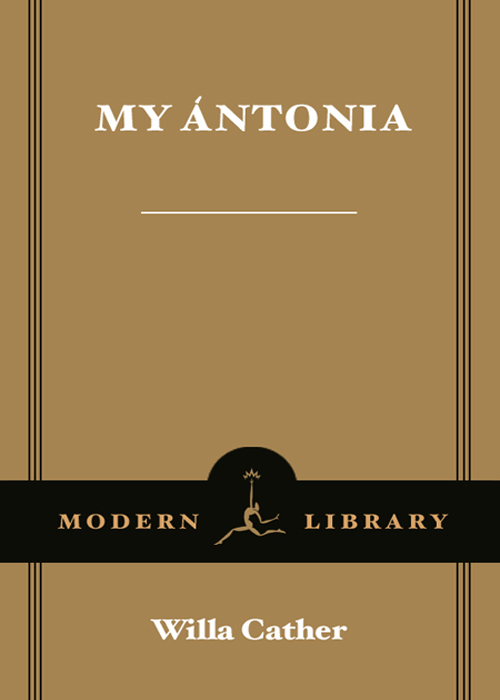
W ILLA C ATHER
M Y NTONIA

T H E M O D E R N L I B R A R Y
N E W Y O R K
Contents
1996 Modern Library Edition
Biographical note copyright 1993 by Random House, Inc.
All rights reserved under International and Pan-American Copyright Conventions. Published in the United States by Random House, Inc., New York, and simultaneously in Canada by Random House of Canada Limited, Toronto.
Jacket photograph courtesy of The Bettmann Archive
LIBRARY OF CONGRESS CATALOGING-IN-PUBLICATION DATA
Cather, Willa, 1873-1947.
My ntonia/Willa Cather. Modern Library ed.
p. cm.
1. Frontier and pioneer lifeNebraskaFiction. 2. Farmers' spousesNebraskaFiction. 3. Women pioneersNebraska Fiction. 4. Married womenNebraskaFiction. 5. Farm lifeNebraskaFiction. I. Title.
PS3505.A87M8 1996
813'.52dc20 95-53224
eISBN: 978-0-679-64121-6
v3.0
About The Modern Library
The Modern Library has played a significant role in American cultural life for the better part of a century. The series was founded in 1917 by the publishers Boni and Liveright and eight years later acquired by Bennett Cerf and Donald Klopfer. It provided the foundation for their next publishing venture, Random House. The Modern Library has been a staple of the American book trade, providing readers with affordable hardbound editions of important works of literature and thought. For the Modern Librarys seventy-fifth anniversary, Random House redesigned the series, restoring as its emblem the running torchbearer created by Lucian Bernhard in 1925 and refurbishing jackets, bindings, and type, as well as inaugurating a new program of selecting titles. The Modern Library continues to provide the worlds best books, at the best prices.
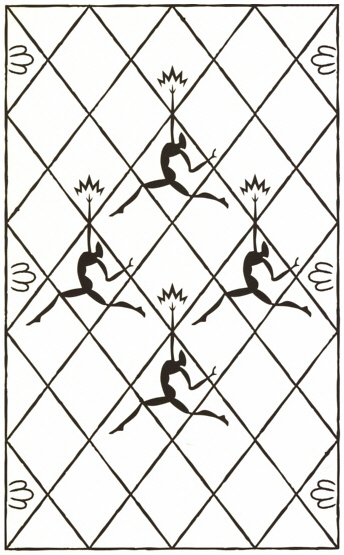
About the Book
The best thing Ive done is My ntonia, recalled Willa Cather. I feel Ive made a contribution to American letters with that book. Set against the vast Nebraska prairie, Cathers elegiac novel features one of the most winning heroines in American fictionntonia Shimerdaa young woman whose strength and passion epitomize the triumphant vitality of this countrys pioneers.
If, as is often said, every novelist is born to write one thing, then the one thing that Willa Cather was born to write was first fully realized in My ntonia, observed Pulitzer Prize-winning author Wallace Stegner. The prose is...flexible, evocative; the structure at once free and intricately articulated; the characters stretch into symbolic suggestiveness as naturally as trees cast shadows in the long light of a prairie evening; the theme is the fully exposed, complexly understood theme of the American orphan or exile, struggling to find a place between an Old World left behind and a New World not yet created.... No writer ever posed that essential aspect of the American experience more warmly, with more nostalgic lyricism, or with a surer understanding of what it means.
WILLA CATHER
W ILLA CATHER was born on December 7, 1873, in Back Creek Valley, Virginia. Her father was a sheep farmer. When she was nine the family moved to Nebraska, eventually settling in the frontier village of Red Cloud. As a child Cather read voraciously, learning Greek and Latin from a neighbor, and displayed an early interest in science. At the University of Nebraska she immersed herself in literary studies and began writing stories and essays; following her graduation in 1895 she worked for some years as a journalist and schoolteacher, living part of the time in Pittsburgh and Washington, D.C., and visiting Europe.
Cathers first book, a collection of poetry called April Twilights, was published in 1903, followed two years later by a book of short stories, The Troll Garden. In 1906 she accepted a job in New York as editor at one of the great American national magazines, McClures, where she stayed for six years, often doing the bulk of the work of putting out the magazine herself. In 1908 she met the novelist Sarah Orne Jewett, whose writing influenced her greatly, and with whom she shared a close friendship until Jewetts death sixteen months later. From 1912 on, Cather devoted herself entirely to writing. For most of her adult life she was based in New York City, but she traveled frequently; she was particularly influenced by her visits to the Southwest from 1912 onward, and to Quebec City beginning in 1928. Her friends included Dorothy Canfield, Mabel Dodge Luhan, Mary Austin, Sigrid Undset, Stephen Tennant, Yehudi Menuhin, and Edith Lewis.
While Cathers first novel, Alexanders Bridge (1912), was not particularly successful, in the nextO Pioneers! (1913)she firmly established the sense of place and the meticulous descriptive style that would inform her best work. She later wrote of O Pioneers!: Since I wrote this book for myself, I ignored all the situations and accents that were then generally thought to be necessary. Her reputation was further enhanced by The Song of the Lark (1915) and My ntonia (1918), and for the war novel One of Ours (1922) she received the Pulitzer Prize. A Lost Lady (1923), My Mortal Enemy (1926), and Lucy Gayheart (1935) were further evocations of the Midwestern setting, but in other works she explored a variety of landscapes and eras: in The Professors House (1925) the contemporary Southwest; in Death Comes for the Archbishop (1927) the Southwest in the period of the Spanish missions, treated in what she called the style of the legends; in Shadows on the Rock (1931), seventeenth-century Quebec; and in her final novel, Sapphira and the Slave Girl (1940), the nineteenth-century Virginia of her own ancestors.
Cathers later stories were collected in Youth and the Bright Medusa (1920) and Obscure Destinies (1930). Of her approach to fiction, she wrote: Art, it seems to me, should simplify. That, indeed, is very nearly the whole of the higher artistic process.... Any first-rate novel or story must have in it the strength of a dozen fairly good stories that have been sacrificed to it. A good workman cant be a cheap workman; he cant be stingy about wasting material, and he cannot compromise. Cather was for many years regarded as one of the most important American novelists and was the recipient of many literary prizes and honors. She died in New York on April 24, 1947.

To
Carrie and Irene Miner
In memory of affections old and true
Optima dies... prima fugit
VIRGIL
M Y NTONIA
Introduction
L ast summer I happened to be crossing the plains of Iowa in a season of intense heat, and it was my good fortune to have for a traveling companion James Quayle BurdenJim Burden, as we still call him in the West. He and I are old friendswe grew up together in the same Nebraska townand we had much to say to each other. While the train flashed through never-ending miles of ripe wheat, by country towns and bright-flowered pastures and oak groves wilting in the sun, we sat in the observation car, where the woodwork was hot to the touch and red dust lay deep over everything. The dust and heat, the burning wind, reminded us of many things. We were talking about what it is like to spend ones childhood in little towns like these, buried in wheat and corn, under stimulating extremes of climate: burning summers when the world lies green and billowy beneath a brilliant sky, when one is fairly stifled in vegetation, in the color and smell of strong weeds and heavy harvests; blustery winters with little snow, when the whole country is stripped bare and gray as sheet-iron. We agreed that no one who had not grown up in a little prairie town could know anything about it. It was a kind of freemasonry, we said.
Next pageFont size:
Interval:
Bookmark:
Similar books «My Antonia (Modern Library)»
Look at similar books to My Antonia (Modern Library). We have selected literature similar in name and meaning in the hope of providing readers with more options to find new, interesting, not yet read works.
Discussion, reviews of the book My Antonia (Modern Library) and just readers' own opinions. Leave your comments, write what you think about the work, its meaning or the main characters. Specify what exactly you liked and what you didn't like, and why you think so.

